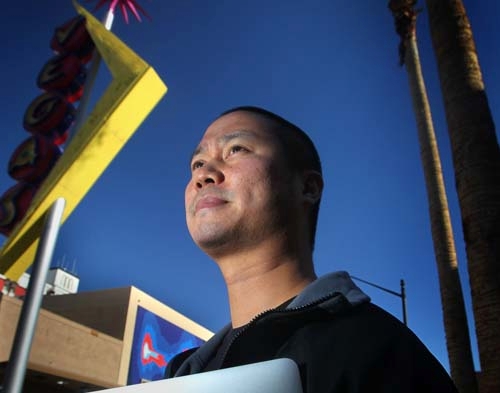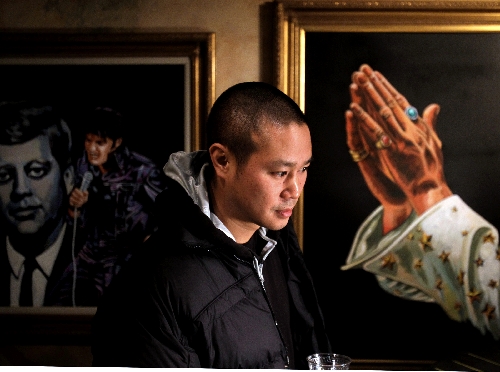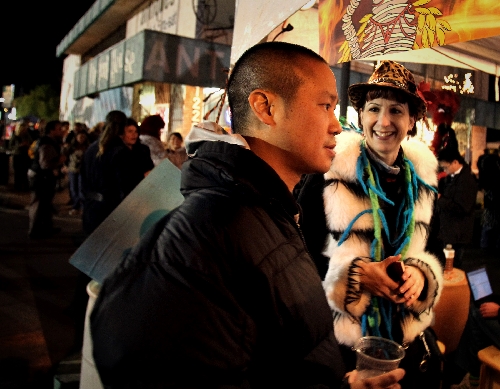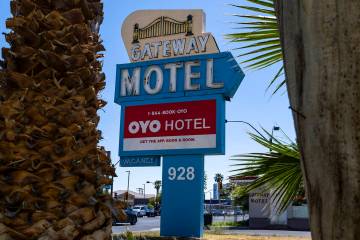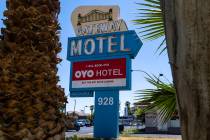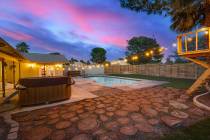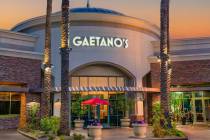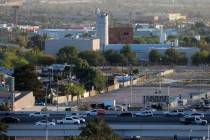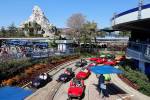Zappos CEO dreams of fixing world by fixing cities
Tony Hsieh couldn't be more different from the murderous mobsters and bombastic billionaires who built Las Vegas.
While those men were quick to boast, make threats or sometimes even slit an opponent's throat in order to build their empires, Hsieh, 38, takes a dreamier approach, literally.
Sarah Nisperos, a fashion designer and friend of Hsieh, recently described how the CEO of online shoe and clothing retailer Zappos made the life-altering decision to move his company's headquarters to downtown Las Vegas and invest hundreds of millions of dollars of his own money to revive the once-troubled area.
He said he had a dream about building another Town Square," Nisperos said, referencing the swanky retail and office center not far from Zappos' current headquarters in Henderson. "But he wanted all these things based on happiness and merit and how nice you are. I said you shouldn't build a strip mall, you should be downtown."
Nearly everyone in downtown Las Vegas knows what happened next. Hsieh, working with Michael Cornthwaite, owner of the Downtown Cocktail Room, and Andrew Donner, a well-connected developer, zeroed in on City Hall.
City leaders had already started building a new City Hall at 495 S. Main St., part of a master plan-driven effort to spur development with big, government-subsidized projects.
At Cornthwaite's urging and with Donner's dealmaking expertise,
Zappos agreed to lease the old building as a company headquarters from Donner's Resort Gaming Group, which would buy it from the city.
What's unknown is how well Hsieh and his team of urban dreamers will mesh their idea-driven, crowd-supported culture with Las Vegas' existing business and government hierarchies.
Hsieh's working through Downtown Project, a company he created with $350 million to spend, to seed technology startups, invest in education and attempt to build a walkable, vibrant downtown.
"You can't dictate what the neighborhood is going to look like. But you can definitely help support and accelerate people's dreams and visions," Hsieh says. "That is really our belief as to what drives our culture. It needs to be organic."
It's a far cry from boardroom standoffs that were part of Steve Wynn's casino-building binge or the blunt force politics Mayor Oscar Goodman used to push the National Museum of Organized Crime and Law Enforcement, aka the Mob Museum, through the political process.
But it's the approach Hsieh used to help build Zappos from nearly nothing to a company with more than $1 billion in annual sales before it was snapped up by Amazon in 2009 for $1.2 billion in a cash and stock deal that left Hsieh in charge, albeit at an annual salary of just $36,000.
The success at Zappos followed Hsieh's sale of LinkExchange, a company he founded, to Microsoft for $265 million in 1998. He's also an author who wrote, "Delivering Happiness, a Path to Profits, Passion and Purpose," a best-selling book that has expanded into a movement with its own website, workshops and support for people seeking to tap the culture of happiness.
It's an approach Hsieh has stuck with even during tough times, like when he poured the last of his personal wealth into keeping Zappos alive without knowing the company would become successful.
With the move downtown, Hsieh is betting the egalitarian culture that made Zappos strong will attach itself to the city so the company and community can flourish.
Hsieh, raised in Marin County, Calif., and educated at Harvard University, and some of his friends have gone so far as to pledge $350 million of their own money to spend on things such as technology startups, education and cultural amenities.
"If you can do it in Vegas then hopefully you can inspire other cities to focus more on their community and revitalization efforts," said Hsieh, who recently sat down with the Review-Journal to discuss in detail the downtown vision. "If you fix the cities, you fix the world."
Hsieh's responses covered everything from how Zappos' culture, fostering "serendipitous collisions" to spur ideas and the pursuit of passion to build happiness, can be expanded to the entire community, to how shipping containers could house startup businesses downtown.
The interview was edited for length and clarity.
Q. You could have moved Zappos anywhere. Why did you choose downtown Las Vegas?
HSIEH. A lot of us at Zappos had already started gravitating toward the Fremont East area and especially hanging out at Downtown Cocktail Room and the Griffin and the bars in the area. It was just a very natural fit for our culture at Zappos. When we found out the City Hall building was going to be available and it was two blocks away, it was almost like too good to be true. It was probably one of the best coincidences in our company history.
Q. What is the significance of doing something that integrates with existing downtown?
HSIEH. We thought about campuses like Nike, Google, Apple. But then, as we started thinking about it more, we realized that those campuses were great but they really didn't contribute to or integrate with the community around them. It just made a lot more sense instead of just focusing on ourselves to focus on the community, the ecosystem, the environment. If we really invest in the ecosystem, it becomes this positive feedback loop. Imagine if every bar, restaurant and coffee shop was like "Cheers," you are going to run into someone you know. The goal is to create everything you need to live, work and play within walking distance and to make downtown Vegas the most community focused large city in the world.
Q. You research and speak a lot about happiness. What is it like trying to cultivate happiness in Las Vegas, which by many measures is unhappy?
HSIEH. The way people have been living in Vegas, a lot of people not even living in Vegas investing and flipping houses, or whatever, they are not really getting those social connections which is what as a species we are designed for. They are trying to make a quick dollar, and that is not really contributing to some higher purpose. People think, "Once I get this big house or once I get this car or once I achieve this or get this promotion then I will be happy." The good times in Vegas, when it seemed like money was falling off of trees, I think caused people to chase something that ultimately wasn't able to bring them long-lasting happiness.
Q. You have made money and lost money and made money again. Do you fear losing money again?
HSIEH. I've fantasized before I think a really fun game show or reality show would be the equivalent of "Survivor," except a bunch of contestants are dropped into a city where they don't know anybody. All they have is like $100, and they have a year to build a business or whatever. And at the end of the year or two years see who has the most successful business. I think it is more the challenge or creativity that comes with being part of building something that is exciting for me. Even if there was just an ability to wave a magic wand and have it be a thriving downtown tomorrow, that probably wouldn't be that interesting.
Q. How will you know whether or not the Downtown Project is successful?
HSIEH. In some ways it is like anything is better than empty parking lots. The thing about a city is even outside of Vegas I don't think there is ever a point where people say, "OK. This city is done." There is always something, a way for the city to evolve or be improved. I guess it is kind of analogous to the whole happiness thing. It isn't trying to achieve some end goal; it is about ongoing progress.
Q. Describe what downtown Las Vegas will look like and be like in five years.
HSIEH. Those things we just mentioned have most of the things you need to live, work, play within walking distance, a walkable downtown, make it one of the most community focused large cities in the world. We also have other goals like making it the co-working capital of the world.
Q. Do you consider Las Vegas your home now? How long did it take?
HSIEH. It was a surprisingly short process. I originally thought I would be flying back to the (San Francisco) Bay Area every other week for a long weekend and did that for about a month. When I was gone I was looking forward to coming back to Vegas, to home.
Q. Las Vegas Councilman Bob Coffin recently compared you to billionaire visionary Howard Hughes. What did you think of that comparison, and do you ever think of yourself in the context of other Las Vegas visionaries like Steve Wynn or Sheldon Adelson, who can be confrontational and controlling.
HSIEH. I actually don't know much about Howard Hughes to comment on him specifically. In general the way we are approaching things differently from city revitalization projects anywhere is that most of those are really driven top down with some sort of master plan or building these great big buildings. We are really thinking about it much more organically being driven by the community. Our role at Downtown Project is really more about accelerating people's dreams and passions and supporting them on that. I think that is the only way you can build an authentic sense of community. You can't dictate what the neighborhood is going to look like. But you can definitely help support and accelerate people's dreams and visions. That is really our belief as to what drives our culture. It needs to be organic.
Q. What's the reward for you?
HSIEH. The reward for me is, I think just selfishly, I live here and I want to help create the place I'm going to be living in.
Q. What do you think is Zappos' greatest potential?
HSIEH. We started out selling just footwear, a $40 billion market; clothing is four to five times that. That alone is an opportunity from a merchandising perspective. Today we sell clothing and handbags, beauty products, housewares. I don't know if you know Zappos Insights? If you go to the website, you will actually see there is anything from a monthly subscription service to these one-day and two-day seminars where other companies fly in from all over the world. We help them figure out the values that are right for their companies and help them build their own strong cultures and make their customers and employees happy. Between that and the book and people coming on tours and walking away with one idea that can make a change in their office, I think it is much bigger than selling another pair of shoes.
Q. What is Zappos' greatest threat?
HSIEH. Probably ourselves. The fundamental premise behind Zappos is culture. The belief is that if we get the culture right then most of the other stuff like doing great service, building a long-term, enduring brand or business will just be a natural byproduct of that. Most companies, as they get bigger, the culture goes downhill. Not only do we want to prevent that, but we actually want it to scale and get stronger and stronger which, generally, I think has never been done before. That is a challenge. The only way we have been able to think of to achieve that is if every employee views living in and inspiring the culture as part of their job description.
Q. What would you be doing if you weren't at Zappos?
HSIEH. Probably something along the same lines. I guess for me the interesting aspects (of Zappos) are that it is consumer facing, the brand building part of it, the service part of it, the culture part of it. The fact that it happens to be shoes is just whatever. I was never interested in shoes in the first place.
Q. What keeps you coming into work every day at Zappos?
HSIEH. Ultimately the downtown stuff we are doing is, I think, the most important thing I can be doing for Zappos right now. I'm really focused on trying to make sure we lay the right foundation for Zappos for the next 30 years.
Q. Are the success of the Downtown Project and Zappos intertwined? Are they the same thing?
HSIEH. They are definitely intertwined. The more neighborhood-y, community things for Zappos employees to enjoy, the stronger our culture will be and the more our employees will learn through serendipitous collisions with not just each other but other people in the community.
Q. Do you think of Downtown Project or Zappos as something that is sustainable after Tony Hsieh?
HSIEH. That is definitely the goal in general in everything we do, whether it is the culture or the community to really be organically driven. My role at Zappos is more about making sure we are not doing things that prevent an employee's creative ideas from being expressed.
Q. If you are not there to do that, will there be someone there to do that?
HSIEH. It kind of goes back to it is everyone's job to protect our values and to grow the culture. I guess we don't really have an explicit succession plan. But I can also tell you that the only compensation I'm getting from Amazon is $36,000 a year with no chance of bonuses or stock options or anything. So, in theory, I could walk away at any moment but I haven't. In a weird way, that only gives me more leverage over Amazon, because they know the only thing keeping me at Zappos is my happiness, and what makes me happy is us being run independently and maintaining our culture.
Q. Given the flat organizational style at Zappos, what have you learned trying to blend the company culture with that of an established city, which is a hierarchical organization? You don't make a lot of personal political donations. Do you feel like you are going to have to figure out the political process to succeed?
HSIEH. I make a political donation to anyone who takes the time to tour our offices. That's my policy. In some ways, that is how we have always been at Zappos. We kind of do things a little differently. Even when we started getting in footwear, everyone said you can't sell shoes online. And then they said you can't build a brand around customer service, you can't scale culture. So I guess we are pretty used to people telling us we can't do something because we are not doing it the traditional way. We are not trying to get heavily involved in politics or whatever. I think that would drive me nuts personally. It is just a lot of bureaucracy. I would much rather partner with people who understand the political process and enjoy it versus trying to understand it myself. I guess maybe at a super high level I need to understand it probably more than I do. I didn't even know the city was moving into the new City Hall until it was half built.
Q. Do you feel like you have enough educated workers here, or do you feel like Nevada needs to improve education at whatever cost, even if it means raising taxes on businesses like Zappos and Amazon?
HSIEH. What really matters is learning. There is formalized classroom learning, but most innovation actually comes from outside whatever industry you are in, applying something from another industry to yours. And even things like teacher-student ratios, there are creative ways of adjusting those. What really matters is not the student-teacher ratio. What matters is the amount of quality interaction between each student and teacher. I don't have an answer for you for what is the magic way to fix education.
Q. But the discussion in Nevada is mostly about whether or not to raise taxes to spend more on education. Where do you stand on that?
HSIEH. I just don't have enough information personally to know whether that is the right thing or not. I don't know if the way education is currently set up, which is designed for what the U.S. looked like 200 years ago, necessarily makes sense today. One of the weird things about education is, even for someone in high school right now, the stuff that a lot of them are going to be doing after they graduate from college for a profession hasn't even been invented yet. So how do you study for that?
Q. What are the most exciting results of the Downtown Project so far?
HSIEH. The most surprising thing has been just how excited people are about it. I wasn't expecting such a widespread appeal to the idea. (Startups) Ecomom, Romotive, Habitlabs, they originally were going to move to the Bay Area. It is like trying to do 200 startups at the same time.
Q. What are the greatest frustrations?
HSIEH. Right now the frustration is there just aren't buildings. There are people that are ready to open up their cupcake bakery, and we're looking at things like shipping containers and building more retail. What if one of the other goals was to actually make downtown Las Vegas the shipping container capital of the world, in terms of retail and residential. If you make it super easy for someone to basically open up a shipping container retail store and design it however they want, that could be something that just completely explodes.
Q. Do you think about or characterize how Zappos is run relative to how the rest of the world works?
HSIEH. If anything, it is the opposite. We had never run a call center before we opened ours, and no one had any call center experience. Now when other call centers come through and tour, they say things like, "I can't believe you don't grade your reps on how quickly they get the customer off the phone." It wasn't like we looked at other call centers and said we are going to do the opposite of them. We just said what should we do that feels right to us. That is just kind of how we approach things. We don't really go around thinking we are innovative.
Contact reporter Benjamin Spillman at bspillman@reviewjournal.com or 702-229-6435.



